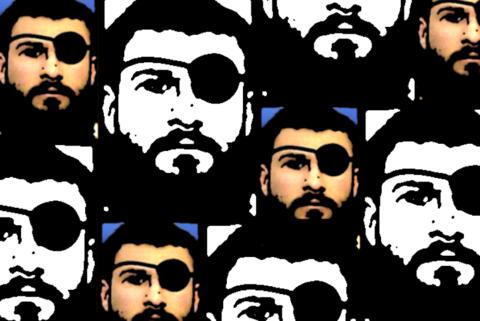Today Marks 23 Years Since the Capture of Torture Victim and Guantánamo “Forever Prisoner” Abu Zubaydah

An image using a photo of Abu Zubaydah at Guantánamo, created by Brigid Barrett for an article in Wired in July 2013.
If you can, please make a donation to support our work throughout 2025. If you can become a monthly sustainer, that will be particularly appreciated. Tick the box marked, "Make this a monthly donation," and insert the amount you wish to donate.
By Andy Worthington, March 28, 2025
Today, March 28, marks a grim milestone on the "war on terror" declared by George W. Bush after the terrorist attacks of September 11, 2001, whose sole remaining bastion is the prison at Guantánamo Bay, where 15 men are still held — six who have never been charged or tried, and nine caught up, to varying degrees, in the fundamentally broken military commission trial system.
23 years ago today, on March 28, 2002, Abu Zubaydah (Zayn al-Abidin Muhammad Husayn), born and raised in Saudi Arabia to Palestinian parents, and one of the six men still held without charge or trial, was seized, gravely wounded, after a firefight with CIA and FBI agents and representatives of the Pakistani intelligence services, during a house raid in Faisalabad, Pakistan.
He then became the first victim of the CIA’s torture program, flown to Thailand, to the first of the "black site" torture prisons established by the CIA, and was subsequently held, over the next four and a half years, in other "black sites" in Poland, in Guantánamo, in Morocco, Lithuania and Afghanistan.
Early in his captivity, when the U.S. alleged that he was the No. 3 in Al-Qaeda, and had knowledge of countless acts of terrorism including the 9/11 attacks, he was subjected to waterboarding — an ancient form of controlled drowning — on 83 occasions, as well as numerous other torture techniques, and, as a result, he suffers from seizures and brain damage.
In September 2006, he was transferred to Guantánamo, with 13 other "black site" prisoners, and has been held, ever since, without charge or trial, after the U.S. government walked back from all of the claims that it had made about him.
One of three "forever prisoners" — never charged or tried, and never approved for release either, unlike three of the other 15 men still held — he has persistently had his ongoing imprisonment recommended by Periodic Review Boards, a high-level administrative review process, established under President Obama, which is almost the only way for prisoners not charged in the military commissions to get out of Guantánamo.
In January, just before President Biden left office, numerous U.N. Rapporteurs and members of U.N. Working Groups called for his immediate release, although their request was ignored. They stated, "We are exceptionally requesting a Presidential pardon for Mr. Abu Zubaydah, owing to his treatment while in detention and the lack of due process since he was first detained. His immediate release and relocation to a third safe country are long overdue. Mr. Abu Zubaydah suffers serious health conditions, including from injuries sustained during torture that are allegedly exacerbated by the denial of medical attention. In addition, lawyer-client communication has been seriously impeded. In addition to his liberation, we request that Mr. Abu Zubaydah is accorded an enforceable right to compensation and other measures of reparation, in accordance with international law."
To mark the shameful 23rd anniversary of his capture, please read an article on my website, U.N. Condemns 21-Year Imprisonment of Abu Zubaydah as Arbitrary Detention and Suggests that Guantánamo’s Detention System May Constitute Crimes Against Humanity, which I wrote nearly two years ago, in response to a hugely significant opinion issued by the U.N. Working Group on Arbitrary Detention, who declared that his imprisonment constitutes arbitrary detention, via the flagrant abuse of the relevant articles of the Universal Declaration of Human Rights, and the International Covenant on Civil and Political Rights, and who also expressed "grave concern" that the very basis of the detention system at Guantanamo — involving "widespread or systematic imprisonment or other severe deprivation of liberty in violation of fundamental rules of international law" — "may constitute crimes against humanity."
Despite ordering his immediate release (and reparations), the U.N. Working Group’s opinion was also ignored — and we can only wonder how much all of the above is in relation to CIA operatives’ request to headquarters in Langley, in the early days of his torture, when they feared that he would die, that, if he were to survive, he should “remain in isolation and incommunicado for the remainder of his life.”
Under Donald Trump, of course, it is impossible to imagine that there will be any progress made towards either approving Abu Zubaydah for release, or freeing him as requested by the U.N. Rapporteurs and other U.N. experts, but his case has always been one of the most shocking in the whole of the "war on terror," and I felt that it was important to remember him today.
Note: For further information, please read this submission to the U.N. Human Rights Committee in September 2023 about Abu Zubaydah’s case, by Prof. Helen Duffy, his International Counsel, and Prof. Hannah R. Garry, the Executive Director of the UCLA Law Promise Institute for Human Rights, who is one of his U.S. lawyers.




